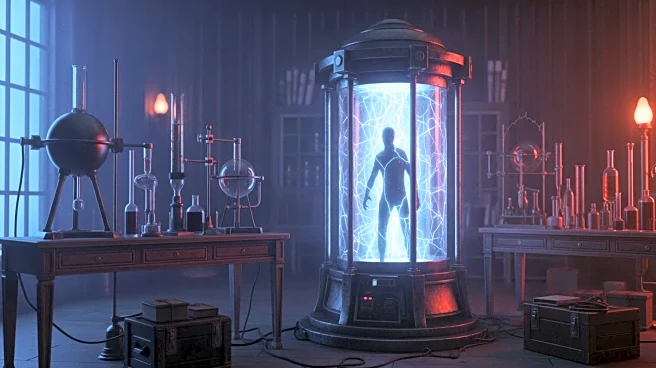What's Happening?
Oscar-winning director Guillermo del Toro is set to release his latest film, 'Frankenstein,' a Gothic interpretation of Mary Shelley's classic novel. The film stars Oscar Isaac as Victor Frankenstein and
Jacob Elordi as the creature, marking a significant addition to the monster movie genre. Del Toro, known for his mastery in creature design and storytelling, has long expressed a desire to reinterpret this tale. The film is anticipated to be the grandest-scale monster movie of the year, with a theatrical release followed by a Netflix debut on November 7. This release has prompted a renewed interest in modern monster movies, highlighting the enduring appeal of creatures like Godzilla, Dracula, and Frankenstein's monster, which tap into primal fears and cultural anxieties.
Why It's Important?
The release of 'Frankenstein' by Guillermo del Toro is significant as it revitalizes interest in the monster movie genre, which has been a staple of cinema for decades. Del Toro's interpretation is expected to offer a fresh perspective on the classic tale, potentially influencing future films in the genre. The film's exploration of themes such as scientific overreach and misunderstood humanity resonates with contemporary societal issues, making it relevant to modern audiences. Additionally, the film's release on Netflix after its theatrical debut reflects the changing landscape of film distribution, where streaming platforms play a crucial role in reaching wider audiences.
What's Next?
Following the release of 'Frankenstein,' there may be increased interest in reimagining other classic monster tales, potentially leading to a resurgence in the genre. Filmmakers might explore new narratives that address current societal concerns through the lens of monster stories. The success of del Toro's film could also encourage streaming platforms to invest more in high-budget, genre-specific films, further altering the dynamics of film distribution and consumption. As audiences engage with 'Frankenstein,' discussions around its themes and interpretations are likely to emerge, influencing both popular culture and academic discourse.
Beyond the Headlines
Del Toro's 'Frankenstein' not only contributes to the monster movie genre but also raises questions about the ethical implications of scientific experimentation and the societal treatment of those deemed 'other.' The film's portrayal of the creature as both a victim and a villain challenges viewers to reconsider notions of monstrosity and humanity. This could lead to broader cultural conversations about empathy, acceptance, and the consequences of unchecked ambition. Additionally, the film's Gothic aesthetic and narrative depth may inspire a renewed appreciation for classic literature and its adaptations.









